In an extensive interview, Sinn Fein leader Mary Lou McDonald warns of consequences of a hard border, the surprises she has experienced since taking power and the Sinn Fein take on Ireland’s next election and Brexit.
Mary Lou McDonald has been President of Sinn Fein since February 2018 coming to the top job just as the breakdown of talks in Northern Ireland and the Brexit crisis hit with full fury.
The 49-year-old Dublin native, a former Member of the European Parliament and currently a member of the Irish parliament for inner city Dublin, replaced the legendary Gerry Adams, the toughest act in Irish politics to follow.
How has that transition been and how will she deal with the upcoming crises in the peace process and Brexit? We talked in a New York hotel where she was the keynote speaker at the annual Friends of Sinn Fein dinner.
On taking over the top job and what has surprised her
I’m surprised, and maybe I shouldn’t have been surprised, that so many in the media and so many of my political opponents, say, “well this woman isn’t really in charge”. Now, I’m used to being critiqued, I’m used to being attacked, I’m used to being criticized. Sometimes, the criticism is valid, other times, I would feel that it’s not, but that’s public life, and that’s politics, but I have been really shocked at the kind of “shadow of the gunman syndrome”.
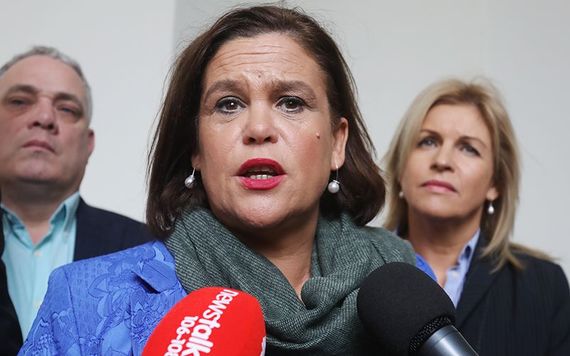
Sinn Fein's Mary Lou McDonald.
There’s an element that they almost find it hard to believe that a woman could actually be the boss, could actually be the person who is in charge.
They don’t seem to be able to get past that and the extent of that, I mean, article after article, that’s written about it. I have been surprised by that, the extent of that, that according to official Ireland, that is the position, and it wouldn’t matter if I solved global warming, world poverty, Irish reunification, Brexit, the whole thing would still be around that.
Do you think it’s a sexist thing or anti-Sinn Fein?
A part of it is to take a pot shot at Sinn Fein and to take the gloss of me, whatever that might be as Sinn Fein leader, and then I think at some level, for at least some of them, I think it’s an unconscious thing. I think it’s a reflex thing, you know, but whatever it is, and we can analyze it, but that has surprised me, the extent of that, and the fact that others haven’t challenged it and said, “well actually you’re wrong”.
Read more: President Trump can deliver a real peace to Northern Ireland with just one move
On her message to Irish Americans
To stick with us, to keep faith, to understand the scope and the scale of what is possible. I think it’s no longer a question of if there will be a referendum on Irish unity, I think it’s a question now of when.
I think the political acoustic and the political rhythm and pace at home has changed dramatically in the last number of years, not least because of Brexit, but not only because of Brexit.
It is very clear that there is a demographic change in the North, that unionism has lost its electoral majority now the last two elections, and more importantly I think, right across the island, a real sense of social change and progression, and a need for a new politics, and we will have to reinvent ourselves economically, politically, in the wake of Brexit, that’s just a fact.
This is a constitutional earthquake that is happening. We need to protect Irish interests but more importantly, not in a defensive way, but in a very progressive and assertive way. We need to break new ground and new horizons. So that’s my message to America, the land of optimism and of eternal innovation and believers in all things that are possible.
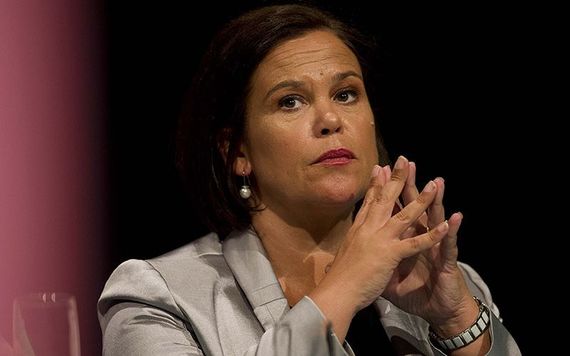
Sinn Fein leader Mary Lou McDonald at the political party Ard Dheis (conference).
On Brexit
Ok, so the issues of concern are in the first instance, for the peace process, and the peace agreements, the whole infrastructure of peace and governance in the North was built on the understanding that Ireland and Britain were both members of the European Union and that is important because it meant that in virtually every facet of law and regulation we had common standards and common law.
All of that is now about to be ruptured, 40 years of law through the shredder. The human rights obligations that are hard-wired into the Good Friday Agreement are derived from European standards and norms, all of that becomes undermined.
On a practical day to day basis, the commerce and service provision in a scenario where one part of Ireland is inside the European Union and another part is outside of the European Union, all of that becomes disrupted, and people need to understand that this Brexit business affects every facet of life.
Read more: Northern Ireland's restrictive abortion laws must end
it’s not limited to just one sector or one part of Irish life, it is all-embracing, it is overwhelming, and therefore, we need very specific protections to ensure no re-emergence of a hard border, and everything that entails, no damage to our economy, or at least to mitigate the damage to our economy and crucially, protection of the rights of Irish citizens living in the North.
So, we in Sinn Fein, way back, before everyone else argued for a thing that we described as “special status”, in other words, to keep the North of Ireland inside the customs union and the European single market.
I’m very happy that eventually everybody, including the government, came to an understanding that that approach was the correct approach and that we needed a particular solution for Ireland. We need a bottom line insurance policy to protect our peace agreement, our economy, and the rights of our citizens. The British Government is resisting that (surprise, surprise) and it’s very important that we push for it.
On the consequences of a hard border
I wouldn’t say a return to violence is inevitable, because the peace process is very strong, and there is no appetite for a return to conflict. You know, we have whole generations now, who have grown up, who haven’t known British soldiers on the streets or Republican actions, and that have lived in a very stable situation.
So, no, there is no great appetite for it, but I have to tell you, it would be a very foolish and a very reckless person who would be prepared to gamble, or to take a chance, however small, that there might be a return to armed actions.
There is no doubt, that a hard Brexit, the re-emergence of a border will cause very significant political upheaval and problems, and increasingly we have the sense that some within Unionism, perhaps, including Teresa May, believe that maybe a hard border re-emerging might be a good thing for the union, you know, that it might secure the Union.
I have told Mrs. May and Unionism in Ireland that if that is their position, it is a very deeply misguided position. If it was a thing that there is no deal or a chaotic deal and that we have a hardening of the border in Ireland, and all of the disruptions that that would represent, well then, far from securing the union, it would, in fact, call for an immediate referendum on unity, the constitutional question would have to be put.
Would you see a case where Sinn Fein would take their seats in parliament in Britain to neutralize the DUP influence?
No, and it’s the centenary of 1918 Sinn election. Abstentionism isn’t just an ideological pure position, it’s a recognition of the fact that Westminster never has and never will do Ireland any favors. That decision affecting Irish people in the island of Ireland are properly taken in Ireland, and history reflects that fact. I think there are a huge misunderstanding and a large amount of wishful thinking on this abstentionism thing.
Some people seem to imagine that there is a way to stop Brexit. That Sinn Fein can ride in and make Brexit stop. That’s not the case, and I’ve said to other people who have raised the abstentionism issue with us, that even if we were to enter Westminster, which we will not do, but even if we were, just be aware of the laws of unintended consequences, because I think it would undoubtedly cause a problem for some remaining MPS within the Tories.
What would it take to end abstentionism? Would you have to have a special Ard Fheis (Convention)?
It would, but that’s not on the cards. What will end abstentionism is Irish unity, and when every Irish constituency elects representatives to the Dail.
On Irish politics and the huge vote, the right-wing candidate Peter Casey received in the recent presidential election
I think we have to be careful not to be melodramatic about Peter Casey and what happened, and I think we also need to be honest, because the honest truth is Peter Casey is not the first person in Irish politics to make negative comments about the traveling community, for political gain, nor is he the first person in Irish politics to make negative, ill-informed comments about welfare and welfare recipients for political gain.
Indeed, our current Taoiseach, dog-whistled that precise sentiment just before he assumed the leadership of his party. So, the first thing is a bit of honesty in this. These things are as old as Irish politics itself, and a second thing is this, to understand, as I understand, there is a very significant anger in the Irish public with the government that has failed, and it has failed in its basic provision of a safe roof over people’s heads.
So, I read the Peter Casey phenomenon as being largely driven by that discontent and anger. I do accept there is a bigoted minority, that there are people who hold racist views. I absolutely get that, and I accept that, would you be concerned about that? I will always be concerned about people who hold those views, but I wouldn’t be afraid of it, and I certainly wouldn’t be alarmed by it.
I think that it is a reflection of the fact that all is not well in Ireland, and that we have very very significant social disruption, and in the case of the Presidential race, albeit in a very dishonorable way, Peter Casey spoke to that, that is my assessment.
On the disappointing performance of Sinn Fein in the presidential election
Liadh Ní Riada Your Sinn Fein candidate in the Presidential election didn’t do as well as you were hoping. What do you attribute that to?
Possibly a mix of things, I don’t think that any of us can be definitive on it. No doubt incumbency, the popularity of Michael D Higgins the fact that the Irish political establishment didn’t want an election, and then they didn’t want a campaign, so to an extent the non-participation, the fact that the other parties sat on the sidelines, almost sucked the oxygen out of the competitive sense of the campaign.
Liadh was a really really excellent public representative, and an excellent candidate, a very talented woman, but it wasn’t to be, and of course we were disappointed, we will, in time, analyze it and learn from it organizationally and politically, but as they would say in Irish “Beidh La Eile” or “ there will be another day”.
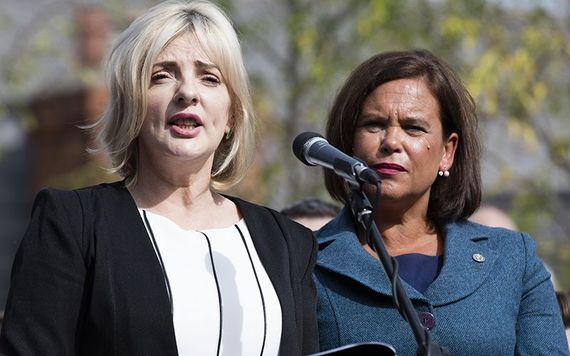
Sinn Fein presidential hopeful in 2018 Liadh Ní Riada and the party leader Mary Lou McDonald.
On political opponents
There’s a view Leo Varadkar is a far better nationalist than Fianna Fail leader Micheal Martin in Irish America - do you think that is true?
I think Michael Martin’s positions on lots of things, the North, the collapse of the institutions, the behavior of the DUP on Brexit, has been quite frankly weird, not least because it comes from Fianna Fail, nominally a Republican party, a Nationalist party, very, very strange, he has positioned himself in the party in a very strange way.
Leo Varadkar, Fine Gael, the first time I heard them speaking of Irish unity, I looked to the Dublin skyline to see were little pigs flying across, but no, they weren’t. I think it’s a sign of the profound change that has happened in Ireland, and a lot of that, not all, as I said earlier, a lot of that is around Brexit, and I think they know which way the wind is blowing, and I think they know what the direction of traffic is, and as I have said to Leo Varadkar, and Simon Coveney, they are in government, it’s not simply that they are the leadership of Fine Gail and they have to have a plan, and they need to be more explicit in their plans for Irish unity....and where Leo and the government are doing the right things in advancing Irish interest, we will back them and we have backed them 100 percent.
As regards coalition There is no ideal dream partnership for us. I mean, Fianna Fail and Fine Gael, are essentially the same. There isn’t an iota really in policy difference between them in any substantial way. My job as leader will be to lead the general election effort, set out our policy platform, set out our team, and we have very considerable talent and energy on the team, and after the election, like I have said many times, I’ll talk to everyone, I’ll talk to Fine Fail, I’ll talk to Fine Gael, I’ll talk to the Greens, I’ll talk to the Social Democrats, and at that stage, then, you assess, is it possible yes or no, to agree with some formulation, a Dail majority, and crucially a program for government that can actually deliver.
When we discuss the whole coalition thing, it’s, what’s achievable, and then with who. The lads say that they’re not going to talk to me. Leo says he won’t talk to me. Michael Martin says he won’t talk to me, that’s fine. I think that’s childish. They also say they won’t talk to each other, they’re going to end up talking to themselves, but as far as I have made it clear that I will speak to everybody, I think that’s what grown-up politics does.
Do you factor in at all the fact that minority parties in Irish government coalitions in the past have been absolutely massacred?
Yes, and funny enough look, of course, there would, of course, be cautious, and of course, I’m cautious about that. I mean, you would be absolutely reckless not to learn from the experiences of others, and also, to guard your own political standing, and your own policy platform, and your own party, and the health, of course, but it’s a case of balancing these things up, because there’s that caution on one hand, but, there’s also an understanding amongst all of us, I think now in the party, we’re not simply a party protest opposition.
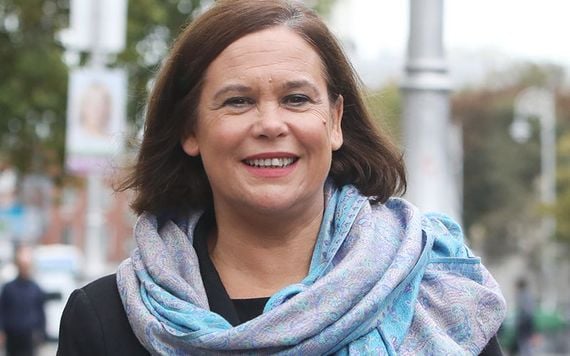
On the streets of Dublin, Sinn Fein leader Mary Lou McDonald.
We are a party that is capable of government, that is capable of innovation. I think, in a way, that the others aren’t, because they’re part of the auld system, and sure, they created it. We’ve never been in government in the South, so we don’t have.
We’re not encumbered with all of the kind of the cultural cul de sacs that these people keep walking down. So, yes, of course that’s a concern, and by the way, that concern, and the best safeguard in respect of that concern is that Sinn Fein can’t go into government without the democratic authorization of a special Ard Fheis, and as you know, because our people, they’re not shy about, you know, putting a halt to what they don’t agree with!
Thank You, Mary Lou McDonald.
Read more: United Ireland the only winning scenario after Brexit, report finds
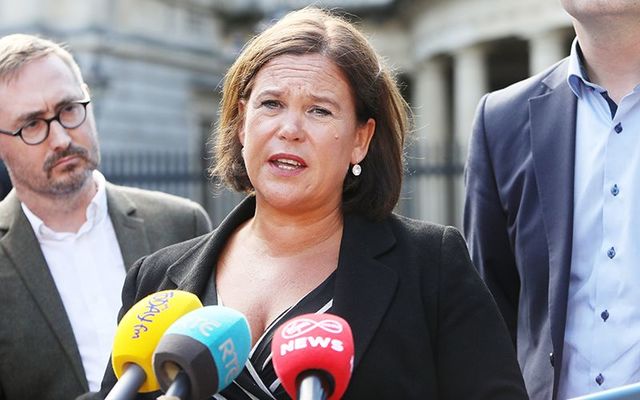



Comments